
When Farrukh Alvi stepped into the world of engineering, he didn’t have a grand plan. His first direction as an undergraduate student was to pursue nuclear engineering, mostly because “it sounded so cool.” But his mechanical engineering classes, especially in fluid mechanics, proved intriguing. He followed that curiosity, which eventually led him to a supersonic wind tunnel in graduate school, where the visual beauty of high-speed flows sparked a lifelong passion for aerospace.
Now a newly named fellow of the Royal Aeronautical Society, or RAeS, Alvi’s journey is a testament to his decades-long career in aerospace and the power of curiosity and commitment to impact.
“It’s an honor to be named an RAeS Fellow, but I plan to continue doing what I’ve always done: working with curious and creative students, solving problems and building programs that matter,” said Alvi, the Don Fuqua Eminent Scholar and Professor of Mechanical Engineering and the Senior Associate Provost for Strategic Initiatives and Innovation at the FAMU-FSU College of Engineering.
The fellowship recognizes individuals who have made exceptional contributions to the aerospace and aviation industries. For Alvi, the honor reflects more than three decades of pioneering research, student mentorship and institutional leadership at FSU.
Since joining FSU in 1993, Alvi has trained dozens of doctoral students who have gone on to highly productive careers in academia, NASA, the U.S. Air Force, SpaceX, Boeing and other major aerospace organizations. He was also the founding director of the Florida Center for Advanced Aero-Propulsion, a collaborative effort that brought together talent from FSU, the University of Florida, University of Central Florida and Embry-Riddle Aeronautical University. The facility was designed to strengthen Florida’s aerospace footprint and is a leading center for research in experimental aerodynamics, especially for supersonic and hypersonic flows, flow diagnostics, materials science and other fields.
Most recently, Alvi played a key role in helping to launch InSPIRE — the Institute for Strategic Partnerships in Research and Education — an FSU initiative to establish a new aerospace and advanced manufacturing hub in Bay County, Florida. The institute is designed to support workforce development, national defense needs and economic growth in the Florida Panhandle.
“We’re building state-of-the-art wind tunnels and advanced manufacturing facilities that will serve both defense and commercial aerospace sectors,” Alvi said. “It’s a one-of-a-kind effort that will train students, support industry and strengthen the region’s economy.”
In addition to his academic and administrative work, Alvi holds more than a dozen patents, several of which he co-invented with industry partners. His collaborations with companies like Danfoss, Cummins and others have led to real-world innovations in compressor technology for automotives and other areas.
“Working with industry is a natural extension of what we do in engineering research,” he said. “It’s rewarding to see our ideas make a tangible impact.”
The most rewarding part of his career, however, has been the opportunity to mentor the next generation of scientists and engineers pushing aerospace technology forward.
“It’s nice to be recognized, but the real reward is seeing students succeed and programs grow,” he said. “That’s what keeps me going.”
Visit aerosociety.org for more information about the Royal Aeronautical Society and this recognition.



